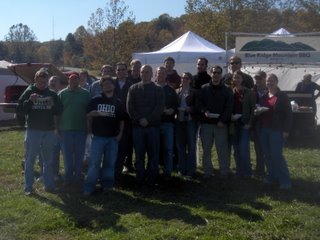Losing it. On the outside of an envelope in the mail today:
It's come to this:
Renew it. Or Lose it.
I don't know about anyone else, but that sounds like a threat to me.
Note to
Sports Illustrated marketing and subscription people: if you would like me to continue paying you to mail me your magazine, it really isn't a good idea to use a threat to let me know that my subscription is almost up. I'm not sure what they are teaching in college marketing classes these days, but you seem to be confused: I'm the customer. In this case--and this is very important, so pay attention--I am a current and potential future customer of
form of entertainment. Sports Illustrated is not a life necessity. It is not electricity or gas or water for my home.
Therefore, the idea is to entice customers with a good and unique product, offered at a reasonable price, and presented with a customer service that is at the very least unoffensive.
Let's take those one at a time: Sports Illustrated is a competant sports weekly that offers some very good longer pieces on issues and figures from the sports world. But it also includes two columnists in Steve Rushin and Rick Reilly who I cannot stand. Rushin is a hack who substitutes playing with people's names for actually saying anything in his column, and Reilly has become a shrill deliverer of politically charged declarations from on high. I can't flip those two pages in the magazine fast enough. So
Sports Illustrated is a solid, sometimes good, but rarely great magazine, that serves the purpose of covering some of the sports news for the week.
But it is certainly not unique. There are plenty of other sports magazines in print, and even more sports news and commentary available online. For local sports news, I spend most of my time reading the Orange and Brown Report, Cleveland.com, and the Akron Beacon Journal Sports page online. For national sports news and commentary--which is always well behind when it comes to the local stuff that I most care about--I read ESPN.com, Fox Sports, and SI.com. For anyone who knows me, it hardly bears repeating that I would rather read Bill Simmons on ESPN.com than any other national columnist. Heck, even the best
Sports Illustrated column for my money is only online--Peter King's Monday Morning Quarterback (and even he is starting to bother me with his political asides).
As far as price goes, Sports Illustrated is not particularly expensive, but it's not particularly cheap either. Put it this way: it costs enough that everytime I renew it, I pause to think about it. That pause only got longer this time, when nine words on the front of that envelope were offensive enough to make me question why I would spend my money on a magazine like
Sports Illustrated.
At the end of all this, the answer is that I won't anymore. And contrary to the threat on the envelope, I will not have lost a thing. But
Sports Illustrated has lost a customer, which is why they exist in the first place. And all they had to do was send me a polite reminder that my subscription runs out in November. Marketing for Dummies.
Then there is Bill Buford writing about the Food Network in the latest
New Yorker. I hate the sentence I just wrote; it reeks of pretension. The
New Yorker, magazine for the supposed demigods of the coasts and the wannabes from the rest of the country. The
New Yorker, magazine of the world's capital, a city that makes up for the almost unbearable crush of people with lots of crime, terrible traffic, high taxes, green space confined to a large park, and surprisingly little history. But at least it's expensive. New York City, home to all the smartest people.
Sour grapes, meet Big Apple. Truth is that you would never see me turning down any offers to write for the
New Yorker. But if I were to pen a story, I certainly would take great pains not to sound as obnoxious as Buford. Nary a paragraph goes by that is not sarcastic or dismissive or snobby or condescending or all four. A sampling of one-liners:
I don’t want to sound harsh—this wasn’t the History Channel—but, on the evidence, there was a surprisingly strong affinity between preparing food and talking baby talk.
...
The point is to get very close to what you are filming, so close that you can see an ingredient’s “pores” (“You should believe the dish is in your living room”), which then triggers some kind of Neanderthal reflex.
...
I’d watched him before, during a taping of “Emeril Live,” starring Emeril Lagasse, the portly Portuguese baker from Fall River, Massachusetts, who was probably more naturally an evangelist than a natural chef....
...
“You should talk to Hugh,” Al said, pointing to a burly man with a handheld camera. “Hugh Walsh is the beauty specialist.”
Hugh was filming a carrot.
...
...apart from Emeril Lagasse, the loud, abrasive Everyman (“Hey! Look at me! Christ, if I can do this, you can, too!”), there weren’t many obvious food talents looking for work.
...
Giada De Laurentiis, of “Everyday Italian,” is not a chef, although she has culinary expertise—she was trained at the Cordon Bleu and worked as a private cook for a wealthy Los Angeles family. She is also the granddaughter of a famous filmmaker, grew up in Beverly Hills, and is lithe and young and pretty, a prettiness that no Food Network executive is going to allow her to hide behind an apron.
...
What quality does Ray have that, say, one of the Molotovs doesn’t? It is probably more apparent in the early broadcasts. A series on perfect burgers filmed during Ray’s first year (the Food Network has done two hundred and fourteen shows on how to make a hamburger) includes a characteristic menu: a “no-muss-and-no-fuss” salad, like coleslaw (Ray has thirteen slaw recipes), followed by some meat dish—during my extended viewing, these tended to include bacon and blue cheese (Ray has eighteen blue-cheese recipes, among them a blue-cheese spaghetti, with a sauce, probably unique in the history of pasta, made from bacon fat, butter, olive oil, chicken stock, and cream swirled together, smothered with blue cheese, and then sprinkled with bacon bits: an intensely flavored creation, even if a little alarming to look at—a viscous dull yellow). On this occasion, many of the ingredients, typically, had been prepared at the supermarket and included sealed bags of pre-sliced cabbage, to facilitate getting everything done before the thirty-minute deadline. The coleslaw would be dressed with soy sauce (“It’s kinda like balsamic vinegar is to red-wine vinegar—it’s a little bit thicker”), but not before Ray had turned on a burner to heat an oven-top grill: this was for her “awesome” turkey patties (“Yummy!”). Heating the oven-top grill beforehand was a tip. So, too, was the use of a garbage bowl—kept on the counter to save trips to the trash—for vegetable trimmings. In fact, the garbage-bowl tip was offered three times. In between, you heard about Ray’s mom (“She watches news a lot—maybe too much”) and her baby brother, who had just turned twenty-seven (“which is just not possible”). There was also her dog, her dad, a theory about cabbage and cancer, some giggles—an effortless patter that, for all its lack of weight, was not without a goofy charm.
I suppose there is some humor in taking gratuitous shots at television chefs and the people who film them, but the humor is pretty limited, especially if you don't include them in the joke. Does Buford honestly think that Rachel Ray and Emeril Lagasse don't know how silly some of this stuff is? Better yet, why didn't he ask them?
Even more important, what was the point of this snotty article? The incoherent conclusion offers few clues on the matter:
Ours is a different audience from the one that watched Julia Child. In 1962, “microwave oven” and “fast food” hadn’t entered the national lexicon. And restaurants were more expensive. Tim Zagat, the publisher of Zagat Guides, points out that for more than two decades the cost of going to restaurants or getting takeout has risen less than the annual rate of inflation—that it’s much less expensive today than at any other moment in our history to pay other people to prepare our dinner. Never in our history as a species have we been so ignorant about our food. And it is revealing about our culture that, in the face of such widespread ignorance about a human being’s most essential function—the ability to feed itself—there is now a network broadcasting into ninety million American homes, entertaining people with shows about making coleslaw.
Get it? It's cheaper to go out to eat, which means humans (presumably humans on the Upper West Side) are ignorant about food. I'm not saying that humans aren't partially ignorant about our food, at least as it relates to the actual farming of crops or the raising of livestock, but Buford provides zero evidence to that effect. Indeed, and maybe I need to overcome a reading disorder here, the evidence he presents actually makes the opposite case. Food Network, which seems to be about food, is broadcast into ninety million homes.
Maybe he thinks these sentences suffice: "I couldn’t recall very many potatoes with dirt on them, or beets with ragged greens, or carrots with soil in their creases, or pieces of meat remotely reminiscent of the animals they were butchered from—hardly anything, it seemed, from the planet Earth. There were hamburgers and bacon, but scarcely any other red animal tissue except skirt steak, probably, it occurs to me now, because of its two unique qualities: its texture and its name."
Oh, Food Network is not about real food, because they prepped the products before cooking them (the comment about red meat is just stupid--go to Food Network's webpage and do a recipe search for "steak" and see what happens).
In the Buford home we eat real food. None of those fake namby-pamby cleaned potatoes, leafless vegetables, or branchless fruits. Everyone knows you're not eatin' if you're not eatin' the soil. That's where the real nutrients are. Next thing you know those ninnies at the Food Network will be serving chicken without feathers and beef without the hide.At the end of his seventy-two hour Food Network-watching marathon--which, by the way, makes absolutely no sense--Buford comes to exactly the wrong conclusion. Food Network and its audience are the people who, on average, know the most about food and eat the best in America. The average income of Food Network viewers is a pretty robust $75,000 a year. My understanding--and if the
New Yorker wants to pay me a dollar or two a word for an article, I will look it up--is that the average income for people and families that frequently get their meals at fast food restaurants is significantly lower than $75,000 a year, which goes a long way toward explaining why our poor are so fat. Even the fattest recipes on Food Network, like Rachel Ray's cheesy pasta, are more healthy than (and just as affordable as) the crud served at McDonald's or Burger King. Sounds to me like there is absolutely nothing wrong with Food Network, except that not enough people watch it.
The funny thing about all this is that I rarely watch Food Network. I get my recipes from elsewhere. But, memo to Bill Buford, I would never conflate a pseudo-farmer populist virtue with that choice. Egads, the
New Yorker can be obnoxious.





